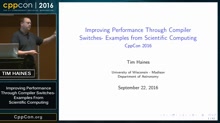The reviews at r/cpp_review have begun!
Participate in the first two reviews at r/cpp_review:
The reviews have begun
by Jens Weller
From the article
A few weeks ago I announced a C++ review community, which since then has grown to 250+ members on reddit. There has been great feedback and discussions since then, so that the idea is now ready to be tested. With August, the first review period has started

 Have you registered for CppCon 2017 in September?
Have you registered for CppCon 2017 in September?  Have you registered for CppCon 2017 in September?
Have you registered for CppCon 2017 in September?  Have you registered for CppCon 2017 in September?
Have you registered for CppCon 2017 in September?  Have you registered for CppCon 2017 in September?
Have you registered for CppCon 2017 in September?